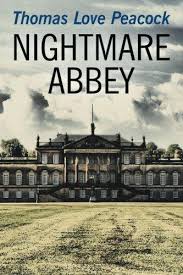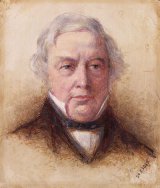Nightmare Abbey Page #2
Nightmare Abbey is an 1818 novella by Thomas Love Peacock, and his third long work of fiction to be published.
The tower which Scythrop inhabited stood at the south-eastern angle of the Abbey; and, on the southern side, the foot of the tower opened on a terrace, which was called the garden, though nothing grew on it but ivy, and a few amphibious weeds. The south-western tower, which was ruinous and full of owls, might, with equal propriety, have been called the aviary. This terrace or garden, or terrace-garden, or garden-terrace (the reader may name it ad libitum), took in an oblique view of the open sea, and fronted a long tract of level sea-coast, and a fine monotony of fens and windmills. The reader will judge, from what we have said, that this building was a sort of castellated abbey; and it will, probably, occur to him to inquire if it had been one of the strong-holds of the ancient church militant. Whether this was the case, or how far it had been indebted to the taste of Mr Glowry's ancestors for any transmutations from its original state, are, unfortunately, circumstances not within the pale of our knowledge. The north-western tower contained the apartments of Mr Glowry. The moat at its base, and the fens beyond, comprised the whole of his prospect. This moat surrounded the Abbey, and was in immediate contact with the walls on every side but the south. The north-eastern tower was appropriated to the domestics, whom Mr Glowry always chose by one of two criterions,--a long face, or a dismal name. His butler was Raven; his steward was Crow; his valet was Skellet. Mr Glowry maintained that the valet was of French extraction, and that his name was Squelette. His grooms were Mattocks and Graves. On one occasion, being in want of a footman, he received a letter from a person signing himself Diggory Deathshead, and lost no time in securing this acquisition; but on Diggory's arrival, Mr Glowry was horror-struck by the sight of a round ruddy face, and a pair of laughing eyes. Deathshead was always grinning,--not a ghastly smile, but the grin of a comic mask; and disturbed the echoes of the hall with so much unhallowed laughter, that Mr Glowry gave him his discharge. Diggory, however, had staid long enough to make conquests of all the old gentleman's maids, and left him a flourishing colony of young Deathsheads to join chorus with the owls, that had before been the exclusive choristers of Nightmare Abbey. The main body of the building was divided into rooms of state, spacious apartments for feasting, and numerous bed-rooms for visitors, who, however, were few and far between. Family interests compelled Mr Glowry to receive occasional visits from Mr and Mrs Hilary, who paid them from the same motive; and, as the lively gentleman on these occasions found few conductors for his exuberant gaiety, he became like a double-charged electric jar, which often exploded in some burst of outrageous merriment to the signal discomposure of Mr Glowry's nerves. Another occasional visitor, much more to Mr Glowry's taste, was Mr Flosky,[1] a very lachrymose and morbid gentleman, of some note in the literary world, but in his own estimation of much more merit than name. The part of his character which recommended him to Mr Glowry was his very fine sense of the grim and the tearful. No one could relate a dismal story with so many minutiæ of supererogatory wretchedness. No one could call up a raw-head and bloody-bones with so many adjuncts and circumstances of ghastliness. Mystery was his mental element. He lived in the midst of that visionary world in which nothing is but what is not. He dreamed with his eyes open, and saw ghosts dancing round him at noontide. He had been in his youth an enthusiast for liberty, and had hailed the dawn of the French Revolution as the promise of a day that was to banish war and slavery, and every form of vice and misery, from the face of the earth. Because all this was not done, he deduced that nothing was done; and from this deduction, according to his system of logic, he drew a conclusion that worse than nothing was done; that the overthrow of the feudal fortresses of tyranny and superstition was the greatest calamity that had ever befallen mankind; and that their only hope now was to rake the rubbish together, and rebuild it without any of those loopholes by which the light had originally crept in. To qualify himself for a coadjutor in this laudable task, he plunged into the central opacity of Kantian metaphysics, and lay perdu several years in transcendental darkness, till the common daylight of common sense became intolerable to his eyes. He called the sun an ignis fatuus; and exhorted all who would listen to his friendly voice, which were about as many as called 'God save King Richard,' to shelter themselves from its delusive radiance in the obscure haunt of Old Philosophy. This word Old had great charms for him. The good old times were always on his lips; meaning the days when polemic theology was in its prime, and rival prelates beat the drum ecclesiastic with Herculean vigour, till the one wound up his series of syllogisms with the very orthodox conclusion of roasting the other. But the dearest friend of Mr Glowry, and his most welcome guest, was Mr Toobad, the Manichaean Millenarian. The twelfth verse of the twelfth chapter of Revelations was always in his mouth: 'Woe to the inhabiters of the earth and of the sea! for the devil is come among you, having great wrath, because he knoweth that he hath but a short time.' He maintained that the supreme dominion of the world was, for wise purposes, given over for a while to the Evil Principle; and that this precise period of time, commonly called the enlightened age, was the point of his plenitude of power. He used to add that by and by he would be cast down, and a high and happy order of things succeed; but he never omitted the saving clause, 'Not in our time'; which last words were always echoed in doleful response by the sympathetic Mr Glowry. Another and very frequent visitor, was the Reverend Mr Larynx, the vicar of Claydyke, a village about ten miles distant;--a good-natured accommodating divine, who was always most obligingly ready to take a dinner and a bed at the house of any country gentleman in distress for a companion. Nothing came amiss to him,--a game at billiards, at chess, at draughts, at backgammon, at piquet, or at all-fours in a tête-à-tête,--or any game on the cards, round, square, or triangular, in a party of any number exceeding two. He would even dance among friends, rather than that a lady, even if she were on the wrong side of thirty, should sit still for want of a partner. For a ride, a walk, or a sail, in the morning,--a song after dinner, a ghost story after supper,--a bottle of port with the squire, or a cup of green tea with his lady,--for all or any of these, or for any thing else that was agreeable to any one else, consistently with the dye of his coat, the Reverend Mr Larynx was at all times equally ready. When at Nightmare Abbey, he would condole with Mr Glowry,--drink Madeira with Scythrop,--crack jokes with Mr Hilary,--hand Mrs Hilary to the piano, take charge of her fan and gloves, and turn over her music with surprising dexterity,--quote Revelations with Mr Toobad,--and lament the good old times of feudal darkness with the transcendental Mr Flosky.
Translation
Translate and read this book in other languages:
Select another language:
- - Select -
- 简体中文 (Chinese - Simplified)
- 繁體中文 (Chinese - Traditional)
- Español (Spanish)
- Esperanto (Esperanto)
- 日本語 (Japanese)
- Português (Portuguese)
- Deutsch (German)
- العربية (Arabic)
- Français (French)
- Русский (Russian)
- ಕನ್ನಡ (Kannada)
- 한국어 (Korean)
- עברית (Hebrew)
- Gaeilge (Irish)
- Українська (Ukrainian)
- اردو (Urdu)
- Magyar (Hungarian)
- मानक हिन्दी (Hindi)
- Indonesia (Indonesian)
- Italiano (Italian)
- தமிழ் (Tamil)
- Türkçe (Turkish)
- తెలుగు (Telugu)
- ภาษาไทย (Thai)
- Tiếng Việt (Vietnamese)
- Čeština (Czech)
- Polski (Polish)
- Bahasa Indonesia (Indonesian)
- Românește (Romanian)
- Nederlands (Dutch)
- Ελληνικά (Greek)
- Latinum (Latin)
- Svenska (Swedish)
- Dansk (Danish)
- Suomi (Finnish)
- فارسی (Persian)
- ייִדיש (Yiddish)
- հայերեն (Armenian)
- Norsk (Norwegian)
- English (English)
Citation
Use the citation below to add this book to your bibliography:
Style:MLAChicagoAPA
"Nightmare Abbey Books." Literature.com. STANDS4 LLC, 2024. Web. 23 Nov. 2024. <https://www.literature.com/book/nightmare_abbey_48>.




Discuss this Nightmare Abbey book with the community:
Report Comment
We're doing our best to make sure our content is useful, accurate and safe.
If by any chance you spot an inappropriate comment while navigating through our website please use this form to let us know, and we'll take care of it shortly.
Attachment
You need to be logged in to favorite.
Log In